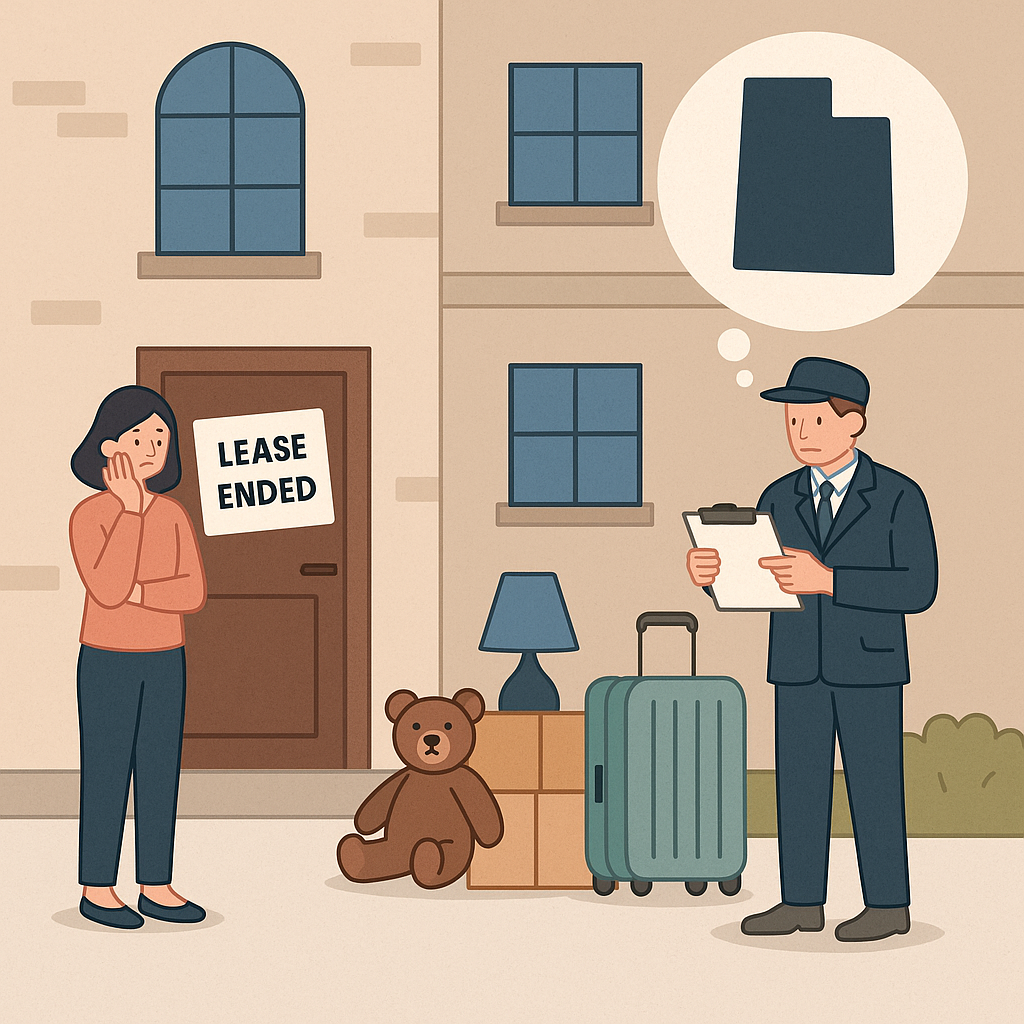What Utah Tenants Need to Know About Personal Property Left Behind After Lease Ends
Plain-English guide to notices, storage, reclaiming items, sales, and dispute prevention
This guide explains what happens when a Utah tenant leaves personal property behind after moving out, including what landlords must do before disposing of it and how tenants can reclaim their belongings.
It is easy to underestimate how common this is. Furniture, clothes, or keepsakes get left behind in the rush to move. But under Utah law, landlords cannot simply throw those items away. They must follow strict notice and storage procedures or risk legal liability. Here is a step-by-step guide on what counts as abandoned property, what landlords must do, and how tenants can protect their rights.
What Counts as “Abandoned” Property
Under Utah Code § 78B-6-816, property is considered abandoned when the tenant has moved out, been evicted, or no longer has legal possession of the unit, and the items left behind appear unwanted or the tenant does not respond to a notice from the landlord.
This typically applies after an eviction or when a lease ends. Personal property can include furniture, appliances, clothing, electronics, and even vehicles. Certain categories like medications, identification, and financial documents require extra care.
Landlords Must Give Written Notice
Before disposing of or selling any property, landlords must provide written notice to the tenant and any known emergency contact or alternate address. That notice should include the following:
Storage Responsibilities
Landlords must store the property in a safe, reasonable location for the entire notice period.
- They may charge the tenant for reasonable storage or moving costs.
- They may hold the items until those costs are paid.
- They may not keep or destroy property as punishment for unpaid rent.
If storage fees are claimed, the landlord should keep receipts and a written log of where and how the property was secured.
Tenant’s Right to Reclaim Belongings
Tenants may reclaim property within the notice period by paying any reasonable storage or moving costs and scheduling pickup at a reasonable time with the landlord.
If the landlord refuses to return the property or charges unreasonable fees, tenants can seek relief in Utah small claims court.
Disposal, Donation, or Sale of Unclaimed Property
If the tenant does not claim items by the deadline, the landlord may:
- Sell the property and use the proceeds to cover unpaid rent or costs,
- Donate items of minimal value to charity, or
- Discard clearly worthless or unsanitary items.
If items are sold, any remaining proceeds must be kept for the tenant for at least 30 days after the sale.
Handling Sensitive Items
Utah practice requires careful handling of sensitive materials:
- IDs and financial records. Secure and destroy properly if unclaimed.
- Prescription medications. Dispose of safely following pharmacy or law enforcement guidance.
Losing or mishandling sensitive items can create privacy or liability issues.
Property Damage During Storage
If the landlord damages or loses stored property through carelessness, the tenant may seek compensation. Courts expect reasonable steps to protect items from theft, weather, or pests while in the landlord’s possession.
How to Prevent Disputes
Good documentation often makes the difference between a smooth resolution and a costly disagreement. Use this checklist:
- Take dated photos before and after move-out.
- Keep copies of all notices and correspondence.
- Maintain an itemized list of property removed or stored.
- Tenants should provide a forwarding address before moving out.
Utah Code Reference
Main statute. Utah Code § 78B-6-816 governs storing and disposing of a tenant’s abandoned personal property. Related provisions in the Utah Fit Premises Act may apply when handling property after eviction.
Video & Social Learning Hub
YouTube: Tenant Property After Move-Out
Need Help Applying This to Your Situation?
Whether you are a Utah landlord handling left-behind property or a tenant trying to recover what is yours, the law provides clear steps. Always give or request written notice, document everything, and act within the time limits of Utah Code § 78B-6-816.
Talk to a Utah AttorneyUtah Law Explained helps make these rules clear so you can protect your property and avoid legal trouble. This guide is educational information, not legal advice. For complex situations, consult a qualified Utah housing attorney.
